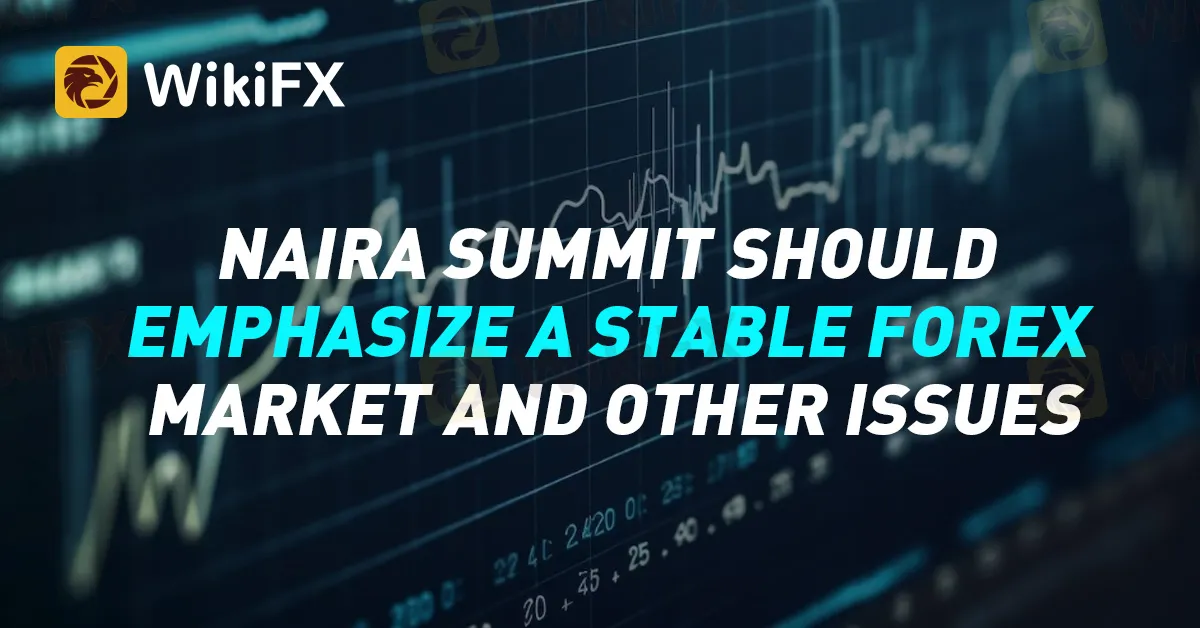简体中文
繁體中文
English
Pусский
日本語
ภาษาไทย
Tiếng Việt
Bahasa Indonesia
Español
हिन्दी
Filippiiniläinen
Français
Deutsch
Português
Türkçe
한국어
العربية
NAIRA SUMMIT SHOULD EMPHASIZE A STABLE FOREX MARKET AND OTHER ISSUES
Abstract:Stakeholders anticipate consolidations in these policies to increase foreign investment in Nigeria as a result of recent changes in the foreign exchange market and the implementation of difficult reforms.

Stakeholders anticipate consolidations in these policies to increase foreign investment in Nigeria as a result of recent changes in the foreign exchange market and the implementation of difficult reforms.
The Central Bank of Nigeria (CBN) has the current political regime to address unconventional policies that have impeded investment and limited economic growth over the previous eight years.
Consolidating these reforms and their effects on establishing an effective and stable FX market will be the main topics of the second edition of “The naira conference,” which will be held by Arbiterz Conferences in association with business journalist Wole Famurewa. The conference's theme is “The naira: Paths to institutional reforms and accelerated growth.”
The gathering, which is slated for August 10, 2023, at the Four Points Sheraton Lagos, aims to promote dialogues between important business figures.
Foreign direct investment in Nigeria, according to recent figures from a UN agency, foreign investment into Nigeria turned negative last year for the first time in at least 33 years.
According to UNCTAD's most recent 2023 World Investment Report, Nigeria's foreign direct investment (FDI) flows decreased to -$187 million in 2022 from $3.31 billion in 2021.
The Naira Conference presents the Nigerian private sector to influence the development of a FX regime that stimulates sustainable investment, supports economic growth, and facilitates long-term structural development, said Abimbola Agboluaje, founder of Arbiterz Conferences, in a statement highlighting the 2023 conference.
Regardless of the price of crude oil, the objective should be to establish a flexible exchange rate system that benefits all economic actors in the short and long terms. The conference's discussions and conclusions would be extensively disseminated to important stakeholders in the economy, and the Nigerian people.
Yokov Fred Agah, Nigeria's leading trade negotiator and a former deputy director-general of the World Trade Organization, will give the opening speech, and other keynote speakers will also be present.
With the withdrawal of subsidies and the forex reform, NGX anticipates a stable economic climate.
The Nigerian Exchange Limited, or NGX, has stated that it supports the President Bola Tinubu administration's current economic reform initiatives and anticipates that they would lead to a more stable economic climate.
The Exchange commended the unification of the foreign exchange market and the elimination of petroleum subsidies, among other things.
At the 62nd Annual General Meeting, or AGM, of the Exchange held in Lagos over the past weekend, Dr. Umaru Kwairanga, Chairman of the NGX Board, said this: We are going to partner with the present administration as it focuses on multiple exchange rates issue, removal of oil subsidy and harmonisation of FX which led to the attraction of foreign investors into the country.
The NGX and the government will collaborate to entice additional businesses to list on the Exchange. We want to improve Nigeria's credit profile, address the causes of increased capital costs, and foster an environment that is welcoming to both domestic and global investors.
In the meantime, Kwairanga thanked the NGX shareholders for their support of the Group since dimutualization and promised that they would start receiving dividends from their investments as soon as possible. We want to overcome obstacles, seize opportunities, and continually provide our shareholders and stakeholders with value.

Disclaimer:
The views in this article only represent the author's personal views, and do not constitute investment advice on this platform. This platform does not guarantee the accuracy, completeness and timeliness of the information in the article, and will not be liable for any loss caused by the use of or reliance on the information in the article.
Read more

OPEC's Profound Influence on the Oil Market
At present, oil prices remain relatively stable, but global economic recovery and shifting market demands continue to drive price fluctuations. Amid an uncertain global economic and geopolitical landscape, OPEC’s policies and actions remain key determinants of oil prices.

What Euro Investors Can't Afford to Miss
For euro investors, geopolitical factors, inflation data, and the European Central Bank's policy direction will determine the market trends over the next few months.

How Big is the Impact of the USD-JPY Rate Gap on the Yen?
The U.S. Federal Reserve's repeated rate cuts and the narrowing of the U.S.-Japan interest rate differential are now in sight. So, why is the U.S.-Japan interest rate differential so important for the yen’s safe-haven appeal, especially when global economic uncertainty rises?

Malaysian Man Killed in Alleged Forex Dispute-Related Attack
A 44-year-old Malaysian businessman, Wong Kai Lai, died after being attacked by about 20 men in Jenjarom, Kuala Langat, on 19 December. Police believe the attack may have been linked to a foreign currency exchange dispute.
WikiFX Broker
Latest News
Will Gold Break $2,625 Amid Fed Caution and Geopolitical Risks?
ECB Targets 2% Inflation as Medium-Term Goal
New Year, New Surge: Will Oil Prices Keep Rising?
PH SEC Issues Crypto Guidelines for Crypto-Asset Service Providers
FTX Chapter 11 Restructuring Plan Activated: $16 Billion to Be Distributed
Think Before You Click: Malaysian Loses RM240,000 to Investment Scam
Bithumb CEO Jailed and Fined Over Bribery Scheme in Token Listing Process
WikiFX Review: Something You Need to Know About Saxo
Is PGM Broker Reliable? Full Review
Terraform Labs Co-founder Do Kwon Extradited to the U.S. to Face Fraud Charges
Currency Calculator






